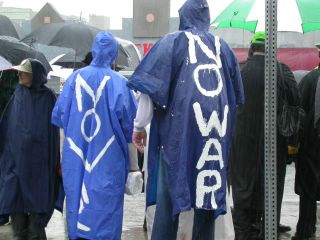Finding Emo?
The definitions were, at first, unanimous. The word is a truncation of “emotional.” Taking Back Sundays is a band, and, musically, emo is a contemporary subgenre of punk. The sub-subgenres include hardcore emo, screamo, and emo-indie. When I asked for examples of emo music I may have heard on the radio, however, the debates began. My students argued whether Dashboard Confessional, Saves the Day, My Chemical Romance, and Death Cab for Cutie were “truly” emo bands or “just pop.” (“Death Cab” was the only band I knew, and also the band most quickly dismissed as “just pop”). As for the radio? Myspace is a more reliable supplier. Even college radio is apparently too quaint a resource for today’s college freshmen. It makes sense; entertainment conglomerates annihilated most small local stations, exiling underground music from commercial radio. The Internet, by creating public access, equalizes the underground and mainstream, the views of the studied and the unstudied, the spins of the government’s advocates and its critics. A vetted scholar and a sixth grade blogger can write whatever they wish, and can both expect to have their writing read by people other than blood relatives. My students, having always had this privilege and expectation of audience, value one another’s (and their own) expertise. When it comes to music, they’re probably right to do so. A decade ago, the “expert” on new music might have been a kid at school who discovered obscure bands by haunting god-knows-where before disseminating his discoveries, via mix-tapes, to the lucky, cool or connected. Now, these experts post the information on Myspace, accessible by cool and uncool alike.
But emo isn’t simply a musical reference. People, too, can qualify as emo. Certainly, it isn’t new for young people to emulate musicians they admire. My own contemporaries, for example, assuredly sat in homerooms with kids dressed like The Cure. And, emo, my students say, does require certain wardrobe essentials: Converse high-tops, tight pants, horn-rimmed glasses, and logo t-shirts that can be purchased at a premium online or at Hot Topic. But the emo lifestyle (like the music-inspired lifestyle trends of every generation) is about more than music and clothes. It embodies a worldview, a mood, a personality. At this point, my students’ definitions varied widely. Some students used “emo” for something I might call “clinical depression” cavalierly stating, “You know, those people who cut themselves. They’re emo.” Many others defined emo people as “whiny,” giving examples like: “Those people who say their lives are horrible, they hate their parents, they’re still upset about that break-up that happened, like, five months ago.” Those critical of emo people defined them as “posers” who use public affectations of misery to seek attention, while those who admire them defended these prophets of life’s pain and meaninglessness. I asked whether emo (as in “you’re so emo”) was a derogatory thing to say. It just depends, they answered. There was, however, a point of agreement: Good or bad, emo people display their sadness shamelessly and dramatically. I wondered: Is this ostensible exhibitionism a reaction to the relative impossibility of privacy in contemporary life? Then I noticed that, despite their description of emo people as shamelessly emotional, not one of the 90-odd students I talked to was shameless enough to call him or herself emo. At least half admitted to “having been accused of being emo” and about a quarter admitted to “listening to emo music” but all included the rebuttal, “but I’m not really emo.”
I asked, “Then who is?” The students claiming they’d been called emo bore no resemblance to one another except in terms of age. There was no overwhelming consistency in their ethnicity, social class, academic ability, clothing (even the quantity and location of their piercings), tolerance toward alternative lifestyles, affect and political leanings. More than a few said they’d’ve voted for Bush in 2004 if they’d been old enough to vote. “Emo isn’t really something you call yourself,” one student explained, but no one seemed willing to call anyone else “emo” to their face, either. Instead, they directed me far from Lakewood, Washington to a specific all-ages club in Seattle and, though I live in Seattle myself, told me how to get there.

